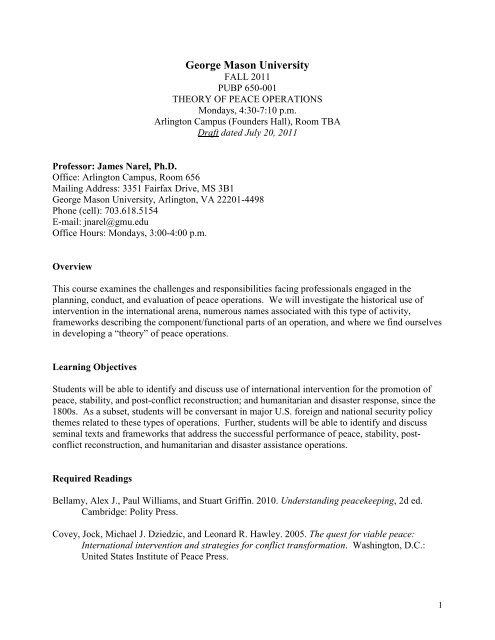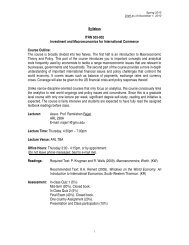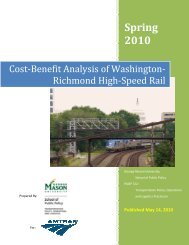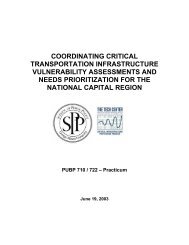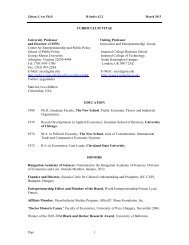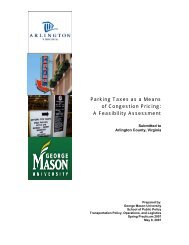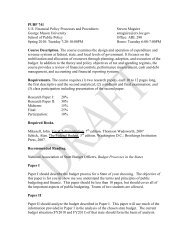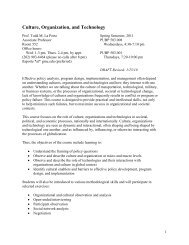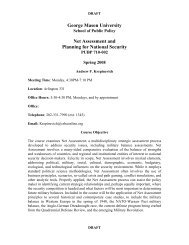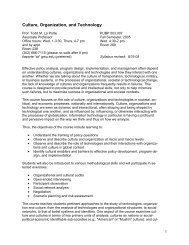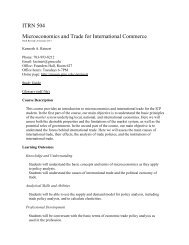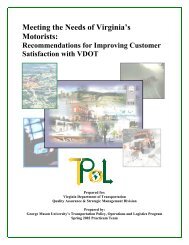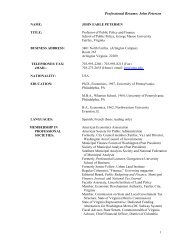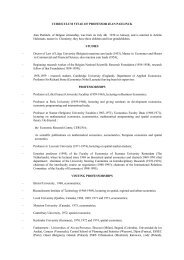PUBP 650-001 - George Mason University
PUBP 650-001 - George Mason University
PUBP 650-001 - George Mason University
You also want an ePaper? Increase the reach of your titles
YUMPU automatically turns print PDFs into web optimized ePapers that Google loves.
<strong>George</strong> <strong>Mason</strong> <strong>University</strong><br />
FALL 2011<br />
<strong>PUBP</strong> <strong>650</strong>-<strong>001</strong><br />
THEORY OF PEACE OPERATIONS<br />
Mondays, 4:30-7:10 p.m.<br />
Arlington Campus (Founders Hall), Room TBA<br />
Draft dated July 20, 2011<br />
Professor: James Narel, Ph.D.<br />
Office: Arlington Campus, Room 656<br />
Mailing Address: 3351 Fairfax Drive, MS 3B1<br />
<strong>George</strong> <strong>Mason</strong> <strong>University</strong>, Arlington, VA 22201-4498<br />
Phone (cell): 703.618.5154<br />
E-mail: jnarel@gmu.edu<br />
Office Hours: Mondays, 3:00-4:00 p.m.<br />
Overview<br />
This course examines the challenges and responsibilities facing professionals engaged in the<br />
planning, conduct, and evaluation of peace operations. We will investigate the historical use of<br />
intervention in the international arena, numerous names associated with this type of activity,<br />
frameworks describing the component/functional parts of an operation, and where we find ourselves<br />
in developing a “theory” of peace operations.<br />
Learning Objectives<br />
Students will be able to identify and discuss use of international intervention for the promotion of<br />
peace, stability, and post-conflict reconstruction; and humanitarian and disaster response, since the<br />
1800s. As a subset, students will be conversant in major U.S. foreign and national security policy<br />
themes related to these types of operations. Further, students will be able to identify and discuss<br />
seminal texts and frameworks that address the successful performance of peace, stability, postconflict<br />
reconstruction, and humanitarian and disaster assistance operations.<br />
Required Readings<br />
Bellamy, Alex J., Paul Williams, and Stuart Griffin. 2010. Understanding peacekeeping, 2d ed.<br />
Cambridge: Polity Press.<br />
Covey, Jock, Michael J. Dziedzic, and Leonard R. Hawley. 2005. The quest for viable peace:<br />
International intervention and strategies for conflict transformation. Washington, D.C.:<br />
United States Institute of Peace Press.<br />
1
Durch, William J., and Madeline L. England. 2009. The purposes of peace operations.<br />
http://www.cic.nyu.edu/Lead%20Page%20PDF/purposesofpeace.pdf (accessed August 24,<br />
2010).<br />
Fetherston, A.B. 2000. Peacekeeping, conflict resolution and peacebuilding: A reconsideration of<br />
theoretical frameworks. International Peacekeeping 7, no. 1 (Spring) : 190-218.<br />
_______. 1994. Putting the peace back into peacekeeping: Theory must inform practice.<br />
International Peacekeeping 1, no. 1 (Spring) : 3-29.<br />
Lacher, Wolfram. 2007. Iraq: Exception to, or epitome of contemporary post-conflict<br />
reconstruction? International Peacekeeping 14, no. 2 (April) : 237-250.<br />
Pugh, Michael. 2003. Peacekeeping and IR theory: Phantom of the opera? International<br />
Peacekeeping 10, no. 4 (Winter) : 104-112.<br />
Correspondence Course<br />
This semester we will be including a correspondence course from the Peace Operations Training<br />
Institute as part of the requirements. History of UN Peacekeeping 1945-1987, by Sunil Ram, may<br />
be obtained via http://edu.peaceopstraining.org/ and will cost approximately $50. The course must<br />
be completed and a photocopy of the graded certificate turned in no later than November 28, 2011.<br />
The follow-on history courses are required in Peace Operations II. Please make sure you are using<br />
the reduced discount for “university student” page provided above, otherwise it costs about $75<br />
more for all three courses!! If the website is asking you for an “eligibility code” it means a<br />
“student”-based question or two may have been answered incorrectly—call the Registrar at<br />
757.253.6933 and indicate you are a Peace Ops student with us and they can fix it in their computer<br />
system.<br />
Course Requirements<br />
Attendance:<br />
The course will be conducted as a seminar rather than in a lecture format. Thus each week’s<br />
assignment must be read before class discussions each week. Active participation in class<br />
discussions is mandatory. Professionals in public policy must be able to speak effectively in small<br />
groups and to make presentations of their work. The only way to learn these skills is to practice, so<br />
students are expected to contribute to discussions and will be required to present summaries of<br />
course readings and their own writing. It is expected that students will keep up with developments<br />
in matters relating to this course.<br />
2
Grading:<br />
• Class Participation: (10%)<br />
• Exams: two in-class exams at 10% each (20%)<br />
• Completion of Peace Operations Training Institute correspondence course (20%)<br />
• Weekly monitoring of an active peace operation, either UN or non-UN: This monitoring will<br />
include a written update circulated to the entire class by e-mail each week (by noon the Sunday<br />
before class) and the possibility of providing short in-class updates (20%)<br />
• Group Project: 20-25 double-spaced pages with references. Proposal due October 17 and<br />
presentation December 12, 2010 (30%)<br />
Course Outline<br />
8/29<br />
Introduction to the course<br />
Mission assignments<br />
Video: Peacekeepers<br />
9/5—LABOR DAY<br />
9/12<br />
Video: Peacekeepers<br />
9/19<br />
Readings:<br />
• Bellamy, Williams and Griffin (2010): Intro and Chapters Two-Five<br />
1 st Mission Report: History of the Presence of your Mission (Sunday)<br />
9/26<br />
Readings:<br />
• Conflict-based theories: Fetherston (1994) [e-mailed to you]; Fetherston (2000) [available<br />
through InformaWorld library database]; and Last (1995): Chapter Two and Six<br />
[http://www.dtic.mil/cgibin/GetTRDoc?AD=ADA299303&Location=U2&doc=GetTRDoc.pdf]<br />
• Conflict frameworks: SPITCEROW, Conflict Assessment Framework, SPIP<br />
• IR-based theory: Pugh (2003) [InformaWorld]<br />
• Post-conflict reconstruction theory: Lacher (2007) [InformaWorld]<br />
10/3<br />
Readings:<br />
• Bellamy, Williams and Griffin (2010): Chapter One<br />
• Durch and England (2009)<br />
[http://www.cic.nyu.edu/Lead%20Page%20PDF/purposesofpeace.pdf]<br />
Frameworks Discussion—CMPO, CSIS, MPICE, etc. [e-mailed to you]<br />
2 nd Mission Report: SPIP Overview (Sunday)<br />
3
10/11 (TUESDAY)<br />
Readings:<br />
• Bellamy, Williams and Griffin (2010): Chapters Six-Twelve<br />
3 rd Mission Report: Overview of Military, Police, and Security Aspects for your Mission (Sunday)<br />
10/17<br />
Readings:<br />
• Bellamy, Williams and Griffin (2010): Part IV and Conclusion<br />
4 th Mission Report: Economic Matters (Sunday)<br />
Due: Group Project Proposal<br />
10/24—Exam #1<br />
10/31—Comp Time<br />
11/7<br />
Readings:<br />
• Covey, Dzidedzic, and Hawley: Chapters 1, 2 and 3<br />
5 th Mission Report: Human Rights Issues and Displaced People (Sunday)<br />
11/14<br />
Readings:<br />
• Covey, Dzidedzic, and Hawley: Chapters 4 and 5<br />
6th Mission Report: Diplomatic Efforts (Sunday)<br />
11/21<br />
Readings:<br />
• Covey, Dzidedzic, and Hawley: Chapters 6 and 7<br />
7 th Mission Report: Governance and Rule of Law Aspects of your Mission (Sunday)<br />
11/28<br />
Readings:<br />
• Covey, Dzidedzic, and Hawley: Chapters 8 and 9<br />
8 th Mission Report: Recommendations (Sunday)<br />
Due: Copies of correspondence course certificates<br />
12/5—Exam #2<br />
12/12—Group Projects Due—Presentations<br />
*******************************************************************************<br />
4
Written Assignments:<br />
Each of your written assignments must be submitted by electronic copy. They may be checked<br />
through the School’s database service that surveys published and nonpublished papers, articles, and<br />
books for possible plagiarism.<br />
Plagiarism:<br />
The profession of scholarship and the intellectual life of a university as well as the field of public<br />
policy inquiry depend fundamentally on a foundation of trust. Thus any act of plagiarism strikes at<br />
the heart of the meaning of the university and the purpose of the School of Public Policy. It<br />
constitutes a serious breach of professional ethics and it is unacceptable. Plagiarism is the use of<br />
another’s words or ideas presented as one’s own. It includes, among other things, the use of<br />
specific words, ideas, or frameworks that are the product of another’s work. Honesty and<br />
thoroughness in citing sources is essential to professional accountability and personal responsibility.<br />
Appropriate citation is necessary so that arguments, evidence, and claims can be critically<br />
examined. Plagiarism is wrong because of the injustice it does to the person whose ideas are stolen.<br />
But it is also wrong because it constitutes lying to one’s professional colleagues. From a prudential<br />
perspective, it is shortsighted and self-defeating, and it can ruin a professional career. The faculty<br />
of the School of Public Policy takes plagiarism seriously and has adopted a zero tolerance policy.<br />
Any plagiarized assignment will receive an automatic grade of “F.” This may lead to failure for the<br />
course, resulting in dismissal from the <strong>University</strong>. This dismissal will be noted on the student’s<br />
transcript. For foreign students who are on a university-sponsored visa (e.g. F-1, J-1 or J-2),<br />
dismissal also results in the revocation of their visa. To help enforce the SPP policy on plagiarism,<br />
all written work submitted in partial fulfillment of course or degree requirements must be available<br />
in electronic form so that it can be compared with electronic databases, as well as submitted to<br />
commercial services to which the School subscribes. Faculty may at any time submit student’s<br />
work without prior permission from the student. Individual instructors may require that written<br />
work be submitted in electronic as well as printed form. The SPP policy on plagiarism is<br />
supplementary to the <strong>George</strong> <strong>Mason</strong> <strong>University</strong> Honor Code; it is not intended to replace it or<br />
substitute for it. (http://www.gmu.edu/facstaff/handbook/aD.html)<br />
Citations for Research Papers<br />
The purposes of scholarly citations are several:<br />
1) To show the source for a direct quote or fact not commonly known.<br />
2) To give credit for an idea to the author of a work<br />
3) To show the reader that you are familiar with other scholarship on your topic or to indicate where<br />
further information or analysis can be found.<br />
4) You may also use endnotes to explain something in the text or comment on the source.<br />
The intention is to give the reader enough information to find the source you are using so that he or<br />
she can see if you have quoted it correctly, interpreted it soundly, done justice to the author cited, or<br />
do further research on the topic in question themselves.<br />
Format: Use the standard Chicago Manual of Style “author-date” format, also known as “Turabian.”<br />
If you are not familiar with Chicago, please print off a copy of the “Common References Guide” at:<br />
http://popp.gmu.edu<br />
5
Special Needs of Students<br />
If you are a student with a disability and you need academic accommodations, please see me and<br />
contact the Disability Resource Center (DRC) at 703.993.2474. All academic accommodations<br />
must be arranged through the DRC.<br />
“New Voices in Public Policy”<br />
I will consider nominating the very best papers in this course for publication in New Voices in<br />
Public Policy. New Voices is a student- and faculty-reviewed journal that shares SPP’s finest<br />
student work with the rest of the world.<br />
6


